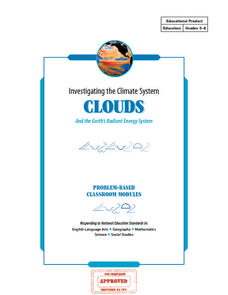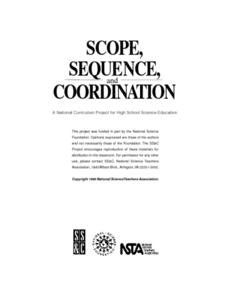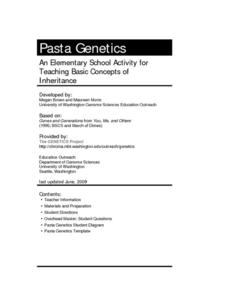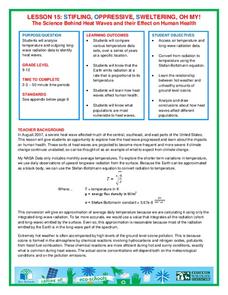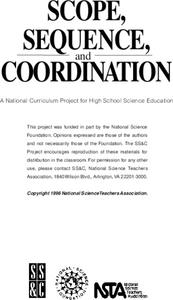Baylor College
Neural Network Signals
Using a simple circuit with the battery representing the brain, future physiologists test to see which solutions conduct electrical "nerve impulses." Enlighten learners with plentiful information on electric signals in the nervous system...
Baylor College
Tools of Magnification
Life science learners need to be able to use a microscope. With this comprehensive resource, they first experience how lenses and magnification work, and then get familiar with using a compound microscope. Tremendous background...
Baylor College
Infectious Disease Case Study
Small groups of life science learners look at Allison's symptoms and discuss a diagnosis. They use a chart of illnesses and draw symptom clues from an envelope to determine what illness she has. A lesson like this gives children an...
We are Teachers
NGSS Explained
Here is a very attractive and well-designed infographic explaining the Next Generation Science Standards (NGSS).
NASA
Precipitation
Here is a fabulous collection of lessons for your emerging meteorologists! In them, learners will utilize satellite data to determine distribution of rainfall, research global rainfall patterns, and utilize their knowledge to propose new...
Baylor College
Crossing the Synaptic Gap
As part of a unit on the chemistry of the brain, thinkers learn how chemicals work to transmit messages between individual neurons and how controlled substances impact the synaptic cleft. They do so by playing a dice-and-card game in...
Baylor College
What Is a Neuron?
Your class won't get on your nerves while doing this modeling activity! After teaching the structure and function of a neuron using the included diagrams, give individuals some clay and chenille stems so that they can make their own...
Curated OER
Hey - It's a Rainy Forest Out There!
Elementary schoolers take part in a very good lesson which has them watch video, conduct experiments, complete hands-on activities, and work in cooperative groups. The educationally-rich activities are clearly-explained, and the group...
Curated OER
Investigating the Climate System - Clouds
Here is a fabulous lesson on the Earth's radiant energy system. This amazing, 31-page document is chock-full of great activities, worksheets, lab sheets, quizzes, rubrics, and assessments. Learners model and explain cloud formation,...
Baylor College
Mapping the Spread of HIV/AIDS
Where is HIV/AIDS most prevalent and what are the current trends regarding HIV? Have groups work together to map the world's HIV/AIDS rates, then create a class map with all the data. Lesson includes cross-disciplinary concepts including...
Staten Island Zoo
The African Savanna
Are you thinking about taking your class to the local zoo? Kids of all ages love visiting exotic animals in order to learn about biodiversity, habitat, and animal adaptations. Here is a 44-page activity guide that provides educators with...
Curated OER
Settlement Exploration: Then and Now
NASA has crafted an imaginative and memorable series of lessons, "NASA and Jamestown Education Module." This lesson is one of the five components. In it, middle schoolers connect history and science by comparing the settlement of...
National Wildlife Federation
Ghost Town
Around 93 percent of the reefs on Australia's Great Barrier Reef have been bleached, and almost one quarter of them are now dead. Scholars research the sea temperatures, especially around the areas with coral reefs, to make connections...
Curated OER
Qualitative Aspects of Rotational Dynamics
Explanations for six different physics lab activities and five suggested assessments are contained in this resource by the National Science Teachers Association. Any combination can be used to open learners' eyes to rotational motion....
Curated OER
Clouds and the Earth's Radiant Energy System
Wow! What a lesson plan! Six terrific activities are described in great detail, in this 31-page document! Learners will model and explain cloud formation, sketch and identify certain cloud types, calculate and compare incoming and...
Curated OER
Newton's Second Law
Three memorable activities build on each other to give physics masters a firm grasp of Newton's Second Law. Pupils play with a lab cart on a flat surface and on an incline to confirm that force is equal to mass times acceleration. In the...
Curated OER
The Human Genotype
Six different chromosome activites introduce biology aces to heredity, chromosomal abnormalities, sex-linked traits, and the human genome. The hands-on activites are fairly simple for the teacher to prepare and will prove to be both...
University of Washington
Pasta Genetics
Four different-shaped and dyed pasta types represent four different alleles. Following a guide sheet, young geneticists practice randomly selecting alleles and discover the traits of the resulting offspring. This is a fun and solid...
National Wildlife Federation
Stifling, Oppressive, Sweltering, Oh My!
Looking for a hot date? Pick any day in August, statistically the hottest month in the United States. The 15th lesson in the series of 21 instructs pupils to investigate the August 2007 heat wave through NASA data, daily temperature...
Curated OER
Gas Pressure, Volume, and Temperature
Physical science learners conduct a simple experiment using the heat of their hands to affect the fluid pressure. They place a balloon atop a freezing cold bottle and observe what occurs as it warms up. Both activities demonstrate how...
Curated OER
Work and Energy
The first activity may not work for your class if you don't have access to an open area of 30 meters and two cars of different masses, but the remaining activities can be used in any physics course. They all involve the investigation of...
Curated OER
Density Studies of the Earth
Density comes to life as investigators place soda cans into containers of various liquids to find if they sink or float. They layer different density liquids, compare densities of different gases, and more. A total of six different...
Curated OER
Neurons and the Nervous System
The highlight of this series is activitiy #4. Anatomy pupils examine slides of three unknown cells. With the function of the nervous system in mind, they consider the structure of each and try to guess which one is part of that system....
Curated OER
Cell Structures and Their Functions
Life science learners investigate live cells. They examine wet mount slides of cyanobacteria and Elodea plants. They peer into the dynamic microscopic world of protists. Afterward, they construct a model of a cell, including rudimentary...
Other popular searches
- Physical Education and Science
- Adaptive Pe Science
- Earth Science Education World
- Pearson Education Science
- Physical Education in Science










